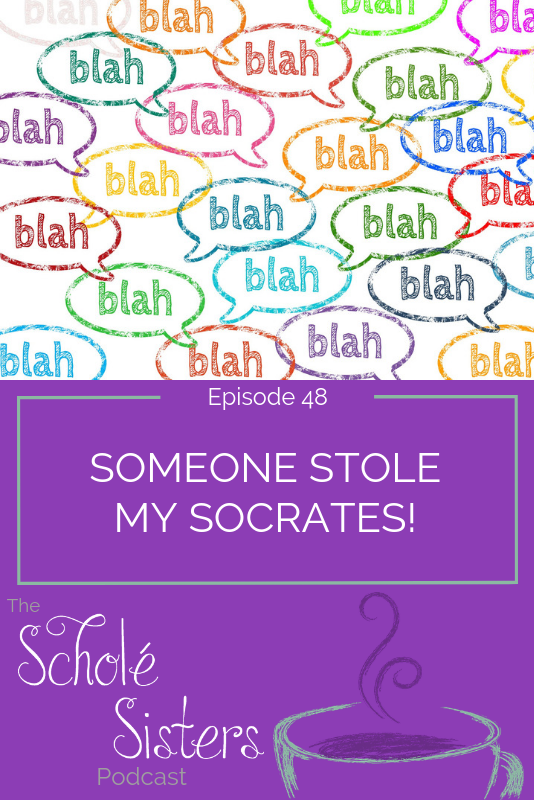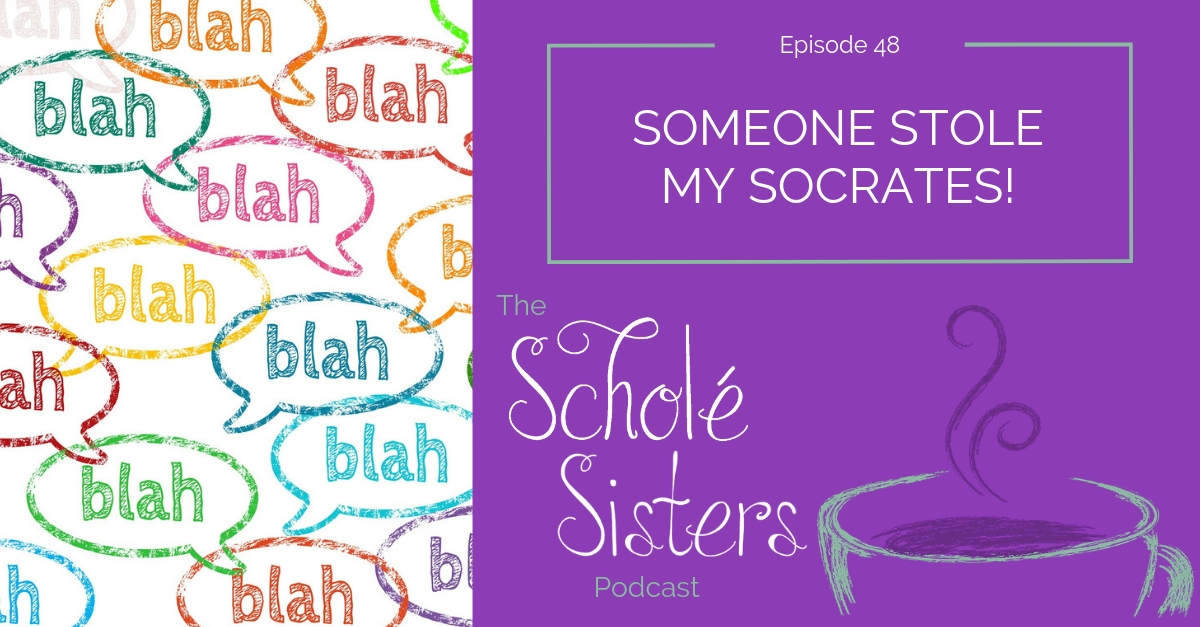SS #48: Someone Stole My Socrates
This episode, Brandy and Mystie discuss the Socratic Method. Is it really classical? Is it progressive? Does it have anything to do with Socrates? Has he been kidnapped and, if so, it is right to hunt him down and steal him back?? This conversation was great fun for us. We think you’ll enjoy it, too!

Thank you to our sponsor:
This episode is sponsored by the Scholé Sisters newsletter! I know what you’re thinking: why in the world is our newsletter sponsoring our own podcast episode? Well, it’s because we want you on our newsletter email list! We’ve got some pretty exciting things coming up, and the newsletter is the surest way to find out all the details. So if you don’t get our monthly newsletter (which is pretty good in its own right), go sign up! Just scroll down to the bottom of this page and fill out the form!
Listen to the podcast:
Podcast: Play in new window | Download
Show Notes:
- Scholé Every Day
- Mystie
The Four Loves by C.S. Lewis
- Brandy
Against the Protestant Gnostics by Philip J. Lee
- Mystie
- Topical Discussion:
- Harkness Cautions: You Need a Sage on a Stage by Joshua Gibbs (Circe Institute)
- The Sage at the Table: A Response to Gibbs by Bill Zimmerman (Circe Institute)
- What is Socratic Dialogue? by Andrew Kearn (Circe Institute)
- Socratic Seminars at Paideia.org
- Great Homeschool Conventions (GHC)
- Socrates
- Plato
- Aristotle
Norms and Nobility by David Hicks
Charlotte Mason’s Home Education Series, volume 3, on Docility and Authority
- Journal of Pedagogic Development by Centre for Learning Excellence
Climbing Parnassus: A New Apologia for Greek and Latin by Tracy Lee Simmons
Please leave us a review in Apple Podcasts!
Leaving a review is easy! Just go to Scholé Sisters in your subscriptions and scroll down.







What resource would you recommend to understand the true Socratic method?
Plato
Having read Joshua Gibbs’ article, I think you took his words a little too literally. He writes literary articles that are not supposed to be read in the same way as one reads Charlotte Mason.
Okay, major props for quoting “So I Married an Axe Murderer”. As a teenager of the 90s, this is still one of my favorite movies. It was pre-Austin Powers Mike Meyers at his comedic best.
Small point of clarification, the quote from Charlie’s Scottish Mom is, “That’s a fact!” They’re quibbling over whether her tabloid (which she calls “the paper”) is real news or not. Charlie says, “Mom, a ‘paper’ contains facts.” Mom says, “This paper contains facts. Pregnant man gives birth, that’s a fact!” It’s such a fantastic scene.
Ok, it’s admittedly a little over the top that I can quote that scene from memory but now I will not be able to read Wikipedia without hearing “That’s a fact!” in a Scottish accent again. Sincere thanks for that, Brandy. 🙂
Hahahaha! I love that you have such an accurate memory of that scene! One of my roommates in college had the DVD and we watched it regularly. I was just telling my husband that I need to watch it again — it’s been too long.
You will love this — to this day, when one of the children stands between my husband and the screen during a football game, he yells “HEED!” And then mumbles, “It’s got its own weather system,” in his best attempt at a Scottish accent.
It was a fun rabbit trail, though, hm? I certainly didn’t realize how many organizations were grabbing classical terminology and emptying it of its meaning!
Oh I love it! It’s such an underrated movie. (And so very quotable.)
Considering that CiRCE published a response to his article and our response was in line with what Zimmerman both corrected and commended, I think we’re safe. 🙂
Yup. You can start with Kern’s article linked above, which also links to Wikipedia, but the best source is the original – seeing how those dialogues actually worked to provoke thought, wonder, and learning.
Ladies, I loved this episode so much! It always inspires me to hear “regular homeschool moms” doing such deep thinking. Drawing the distinction between true and false Socratic questioning was super helpful. Thanks!
Ah! I’m so glad you enjoyed it! ♥
Just an FYI for other people who don’t have audible…I found the C.S. Lewis Four Loves recording on my library’s free hoopla app. 🙂
Okay, I do appreciate the “read Plato to understand the Socratic Method” idea … but I am also one of those people realizing how much I *don’t* know about Classical Education while I try to muddle myself and my children through it. My initial reading of Meno left me flustered, I expected/hoped to be able to just *absorb* the method and the wisdom, but instead sometimes Socrates seemed condescending and I realized I’m not even sure how to read it, if that makes sense. In trying to learn to educate my children in a method I was not brought up with, myself, I feel like I am floundering. And with “Socratic” applied to so many terms (dialog, questions, method, duos, circles, discussions) I start to think I am barely treading water trying to swim with the big kids.
Ha. I think Socrates seems condescending sometimes, too!
You aren’t the only one who raised this sort of question, Kim, and shortly after the episode, we found a homeschool mom named Renee who has thought about this quite a bit. She gave Mystie and I a reading assignment (Gorgias) and next season we’re going to have her on the show to discuss Socratic discussion again, this time in light of a real Socratic dialog … I think it’s going to be super helpful for all of us!